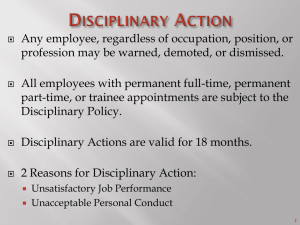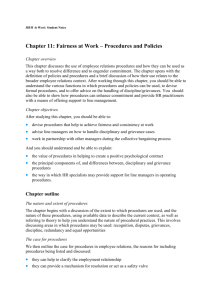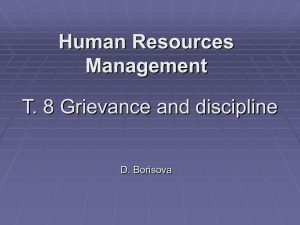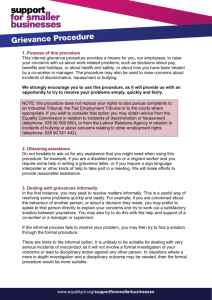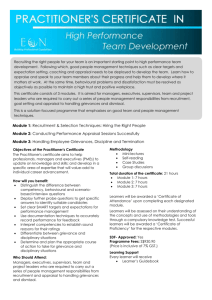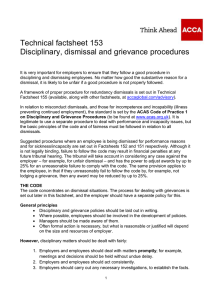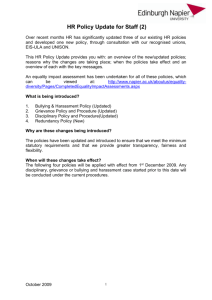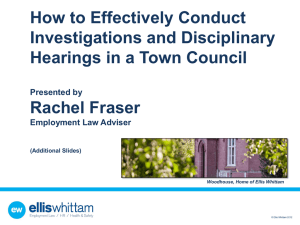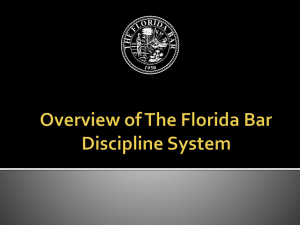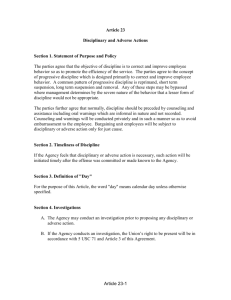ACAS Code of Practice Disciplinary & Grievance
advertisement
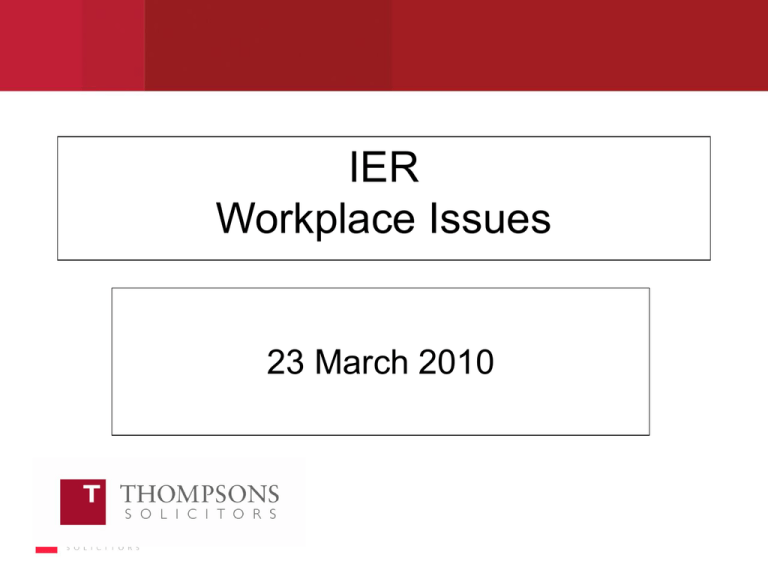
IER Workplace Issues 23 March 2010 Employment Act 2008 • In force 6 April 2009 repealed Statutory Dispute Resolution Procedures • Overview of main changes: – No automatic unfair dismissal for breach of statutory procedures; – No bar to lodging an ET1; – No extension of time limits; – Polkey is back; – 25% uplift/reduction on awards for unreasonable failure to comply with Acas Code. Acas Code of Practice • Main principles: – Only applies to employees – Focus on fairness and transparency; – Disc. And Grievance procedures – written and agreed with employee/TU reps; and – Should be dealt with promptly/consistently/er should carry out an investigation/inform ee/ allow ee to put their case/right to be accompanied/appeal What is Not Covered Disciplinary – misconduct and capability Ill Health SOSR Redundancy Fixed term employees Part time workers Retirement Disciplinary - The Investigation • Investigate without unreasonable delay. • Investigation, by itself, should NOT lead to disciplinary. • Suspension with pay should be brief • Investigation and disciplinary should be conducted by a different person. Informing the employee • Notify ee in writing and right to be accompanied; • Notice should contain enough info about allegation and consequences; • Provide written evidence incl. witness statements; • Date, time and venue • Meeting should be held without reasonable delay but with enough time for ee to prepare. The Right to be Accompanied • Applies if formal warning/other disciplinary action e.g. suspension without pay/demotion etc. if provided for in contract. • TU rep who is not FTO must be certified. • Worker must make reasonable request – what is an unreasonable request. • TU rep can address hearing, respond on worker’s behalf to views and confer with. Appropriate Action • After Meeting er to decide if disciplinary or other action is justified. • Misconduct/performance only give FWW if “sufficiently serious” i.e. serious harm or impact on Company. • Where 1st or FWW is given - set out timetable for improvement required and consequences of further conduct/performance • Even if gross misconduct er should follow fair procedure. Dismissals and Appeals • Dismissal – senior manager should tell ee reason, EDT, notice and right of appeal. • Appeal: – Held without unreasonable delay; – Agreed time and place; – Right to be accompanied; – Manager not previously involved; – Inform outcome ASAP in writing. Acas Disciplinary – Final Points • Where ee persistently or unwilling to attend hearing without good cause er makes decision on the evidence. • If disciplinary against TU discuss with union. • If criminal not automatic consider suitability to do job: relationship er, ee’s and clients. Acas Code - Grievance 1 • Grievance = concerns, problems or complaints that ee’s raise with er (incl. complaints about other ee’s). • Ee should put in writing to manager ASAP. • Meeting to be arranged without unreasonable delay all parties make an effort to attend. • Ee should explain grievance and how to resolve. • Right to be accompanied – if duty owed by er to ee e.g. contract: statute. Acas Code – Grievance 2 • After meeting er should decide what action to take and inform ee in writing without unreasonable delay. • Er notify ee of right of appeal. • Ee notify er grounds of appeal without unreasonable delay – consider time limits. • Appeal – advance notice – impartial manager. • Er notify ee of outcome without unreasonable delay. Acas Code – Grievance 3 • Overlap between grievance and disciplinary: – If grievance raised during disciplinary meeting – er may suspend disc to deal with grievance e.g. discrimination. – If grievance and disc overlap – may deal together e.g. reasonable adjustment and disability dismissal. • Collective – i.e. TU lodges for 2 or more ee’s Code does not apply – use collective procedure. Conclusion • So what does this mean for the law on unfair dismissal ? • Further Reform
